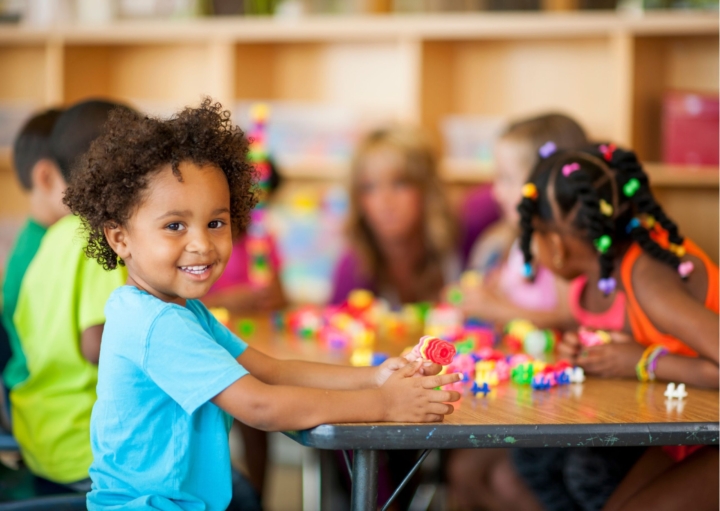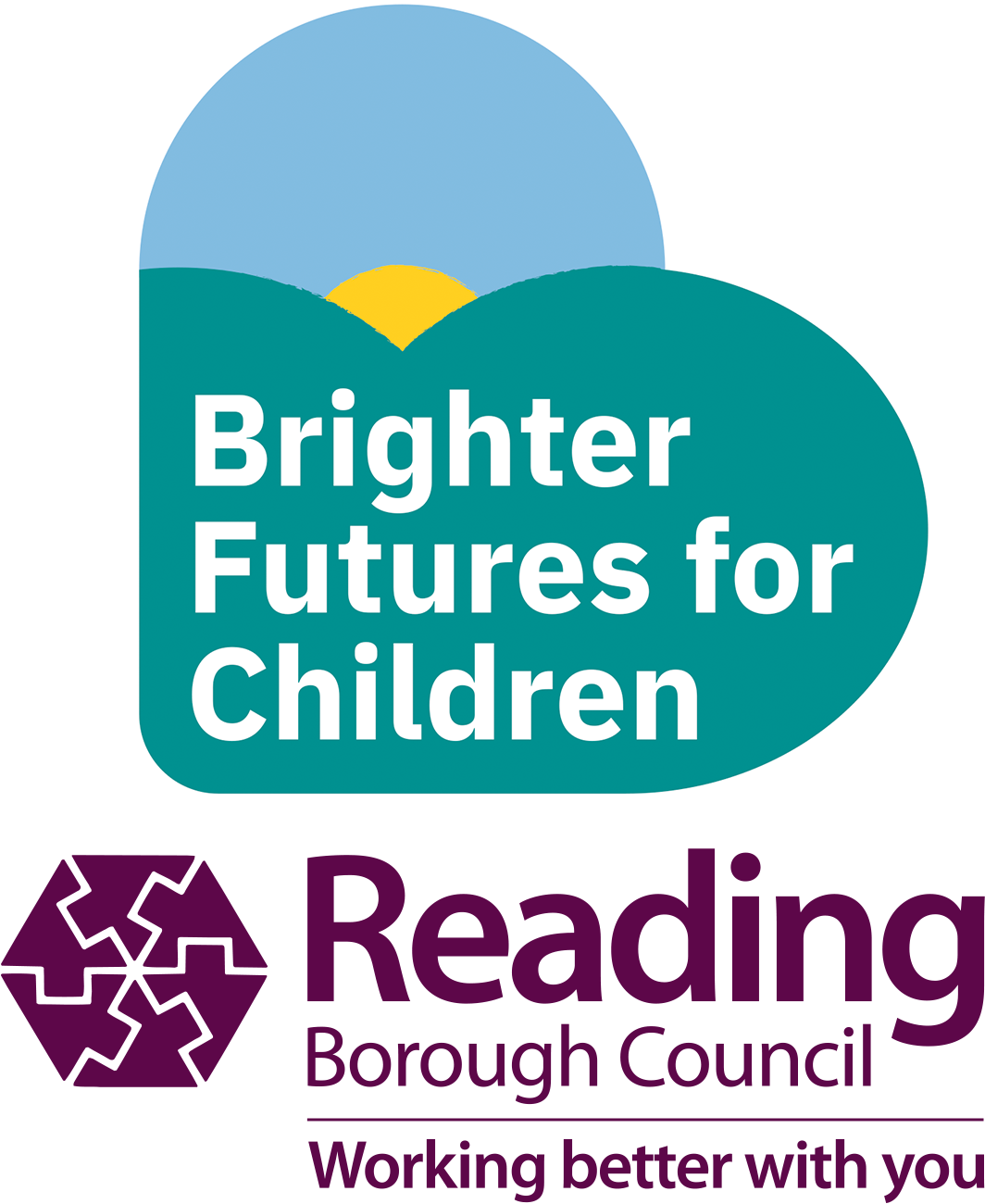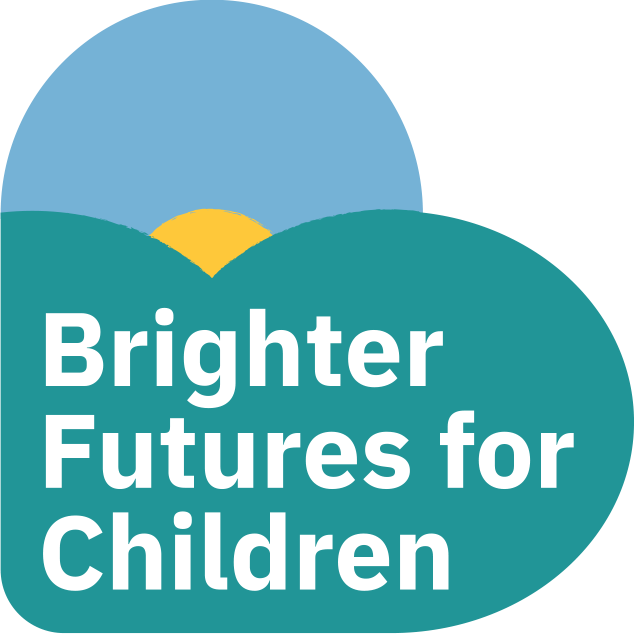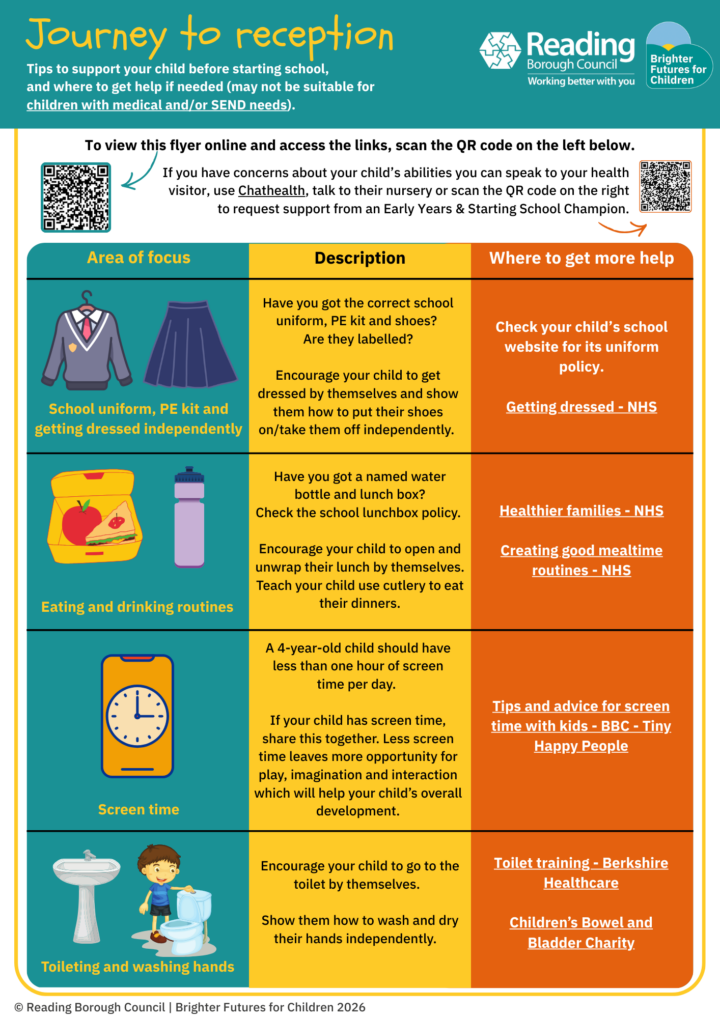- Home
- For parents and carers
- Under 5s
- 3–4 year olds
- Journey to Reception
Your child's journey to school starts at home
If your child is starting Reception in September, this can feel like a big change but there is lots of support available.

This page has lots of helpful ideas you can try at home with your child to help them get ready for Reception and start school feeling confident. If your child goes to a nursery or a childminder, they will also help you and your child get ready for the move to school.
You can also get in touch with your local Reading children’s centre which offers many services that can support you and your child.
How can I help my child?
Every child is different, and learning new things takes time. You can help your child feel ready for Reception by practising little skills with them at home.
If your child needs some extra help before starting Reception, talk to their key worker or childminder. They can work with you to support your child. If you have questions about children with SEND, you can look at the Under 5s with SEND FAQs.
You can also learn more about starting Reception.
Click the titles below to open and read helpful tips and ideas.
If you are worried about how your child is doing, talk to your health visitor, use Chathealth, speak to their nursery or you can ask for help from an early years Starting School Champion – click the button below to fill in the form for a call back.
Helpful, practical steps to support your child
Children aged 3 to 4 years should spend at least three hours a day doing a variety of physical activities. The more the better!
Encourage your child to practice activities which help develop their strength and coordination such as dancing, climbing, playing and digging. Help your child to become a confident mover by making the most of outdoor areas, play spaces and parks in your area.
Time in nature is good for children’s physical and emotional wellbeing.
- Find parks and outdoor spaces in your area Parks, Outdoor Facilities & Open Spaces – Reading Borough Council
- Contact your local children’s centre to find out about physical activity sessions for under 5s.
The NHS has lots of advice for families who are helping children to practice using the toilet, here: Toilet training | Children Young People and Families Online Resource.
Give your child lots of praise and encouragement. Talk to them about why it’s important to wash their hands carefully including after they’ve used the toilet and before they eat.
- Text ChatHealth for health visiting support if you have any toileting worries.
You are your child’s first role model. Sit down and eat with your child, encourage them to try new foods by eating them too, and to make healthy food choices. Show them how to hold cutlery to eat and how to drink from an open top cup. It may take a bit of time for their little hands to get used to it. Reduce your guidance until your child is practicing the skill without extra help.
- Text ChatHealth for health visiting support if you have any food or nutrition worries
- Ask for free Healthy Start vitamins in your local children’s centre
- The NHS provides tips for healthy families including food swaps and lunch box inspiration here – Healthier Families – Home – NHS.
Reading to children can help build important connections in their brain and is a great way to be close to each other. Get comfortable, share a story book and talk about the pictures together. Story telling will help introduce your child to new experiences, learn more words and help develop their understanding of feelings.
- Contact your local children’s centre to pick up a free Bookstart pack
- Find out about your local library ‘Rhymetime’ sessions and how to join: Libraries – Reading Borough Council
- The National Literacy Trust have put together a list of books ideal to share with children as they prepare to start school, which you can find here: Starting school or nursery booklist | Words for Life.
Encourage healthy habits early.
Children aged 2 to 4 years should have less than one hour screen time a day. If your child has screen time, share this together, talk to them about what they are watching to help them understand what they have seen. Your child will learn most from being with you! Less screen time leaves more opportunity for play, imagination and interaction which will help your child’s overall development.
Singing is a fun and easy way to capture your child’s attention.
Include physical actions and encourage your child to practice using movement and words together to help them remember. Repetition is great as this will help to boost your child’s memory.
- Find out about your local library ‘Rhymetime’ sessions and how to join, here: Libraries – Reading Borough Council
- BBC Bitesize has a handy list of sing-along nursery rhymes with videos and lyrics Nursery Rhymes and Songs – A to Z
Mark making is fun and is part of your child’s journey towards writing. Encourage your child to think big and make marks with water or chalk on upright surfaces to help practice large arm and shoulder movements. Also, help your child to practice their hand strength by using smaller objects such as pens and crayons to make marks.
Celebrate their creations and talk about their marks with them, let them tell you all about it!
Visit Pacey’s website for mark-making ideas.
First help your child and talk about the steps involved. Leave the last step for your child such as pulling the zip up once in place.
Recognise their efforts as they practice and encourage them to keep trying. Gradually reduce your help until your child can do each step on their own.
The NHS shares helpful tips for getting dressed.
Enjoy the outdoors with your child. The world around them provides lots of opportunities to talk about new things together. Take the time to notice new sounds and sights and point them out to your child. Ask your child what they notice and give them time to share their thoughts. Games like ‘I-spy’ can help your child to start recognising the sounds in words and is a great game to play when you’re on the move.
- Reading Museum has lots of free family fun opportunities Reading Museum
- The Family Information Service (FIS) has lots of information about things you can do in Reading Reading Directory | Things to do
Imaginary games can help boost your child’s confidence, social skills and language development. Make the most of everyday items you have at home such as empty boxes, blankets and saucepans and encourage your child to play. Join in, follow your child’s lead and get into character! Help them to explore their ideas and practise taking turns.
You know your child best and it is often easy to predict what they need before they even have the chance to tell you!
Provide time for your child to communicate their needs with you first. If they need help you can suggest that you work things out together. Show your child that problem solving can be a positive experience. Your support will help your child feel more prepared to communicate their wants and needs when they start reception.
- Talk positively to your child about starting school and the fun they will have.
- Regularly use their teacher’s name at home to help remind them of this special person.
- Count down the days on a calendar to help your child feel more prepared.
- Share stories about starting school and what your child can expect.
- Notice how your child may be feeling and help them to share this with you. Staying calm and reassuring will show your child that you understand.
- Practice the journey to school together to help familiarise your child with the new routine.
- The National Literacy Trust has put together a list of books ideal to share with children as they prepare to start school: Starting school or nursery booklist | Words for Life.
Build healthy routines
Help your child to get into a good routine early. A consistent routine for bedtime can help promote better sleep which is important for children’s overall health and wellbeing. Establish a regular bedtime and have a predictable routine such as a bath and shared story.
Help your child to get into a good routine early.
Encourage your child to practice dressing into and out of their school uniform. First together, talking through each step. Your child may find it easier to practice fastenings when they are not wearing the clothes initially. Gradually reduce your help as your child feels more confident.
Help your child to get into a good routine early. A consistent mealtime routine can encourage good eating habits and support children to develop regular patterns of eating ready for school. Encourage your child to remove any packaging, peel fruit and open containers to help build their independence.
Help your child to get into a good routine early.
Children need to brush their teeth with fluoride toothpaste twice a day. Help your child to practise this skill and supervise until they are at least seven years old.
Teeth are important for eating, speaking, self-confidence and overall health.
- Find a dentist near you Find a dentist – NHS
Information for professionals
If you work with families who are preparing their child/ren to be ready to start school,
we have a page with resources to help you support them too.



